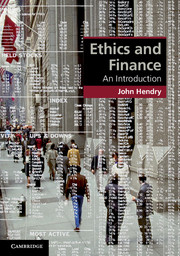Book contents
- Frontmatter
- Contents
- Preface
- Acknowledgements
- 1 Opening case study: the financial crisis
- 2 Introduction
- 3 Ethical foundations
- 4 The financial system
- 5 Lending and borrowing: where finance meets ordinary people
- 6 Trading and speculation: the ethics of financial markets
- 7 Agency and accountability: managing other people’s money
- 8 Products, promotion and client relationships
- 9 Financial reporting and corporate governance
- 10 Epilogue: the ethics of financial regulation
- Glossary
- References
- Index
4 - The financial system
Published online by Cambridge University Press: 05 June 2014
- Frontmatter
- Contents
- Preface
- Acknowledgements
- 1 Opening case study: the financial crisis
- 2 Introduction
- 3 Ethical foundations
- 4 The financial system
- 5 Lending and borrowing: where finance meets ordinary people
- 6 Trading and speculation: the ethics of financial markets
- 7 Agency and accountability: managing other people’s money
- 8 Products, promotion and client relationships
- 9 Financial reporting and corporate governance
- 10 Epilogue: the ethics of financial regulation
- Glossary
- References
- Index
Summary
Much of this book will be concerned with the ethical issues that arise in particular financial practices. For each area of finance, we shall ask whether particular practices are ethically acceptable – or even, in some cases, ethically admirable – or whether they give rise to ethical difficulties and, if so, of what kind. As we noted in Chapter 2, however, moral critics of finance are concerned not only with such things as how banks and other financial services companies lend, trade or treat their clients, but also with the way the system as a whole operates. There is a widespread view that the global financial system as a whole is morally bankrupt.
For almost anyone involved in finance, or in business of any kind, such a viewpoint seems on the face of it absurd. Banks and insurance companies, stocks and shares, financial instruments and the markets in which they are traded are a simple fact of modern life. They have evolved to meet economic demands and they are used and taken for granted by almost everybody in the developed world. Some people see them as a positive good, while for others they are just part of the institutional background, with no particular moral connotations one way or the other. But the common underlying assumption is that they are at least utility-enhancing: we would be worse off without them.
- Type
- Chapter
- Information
- Ethics and FinanceAn Introduction, pp. 79 - 125Publisher: Cambridge University PressPrint publication year: 2013



